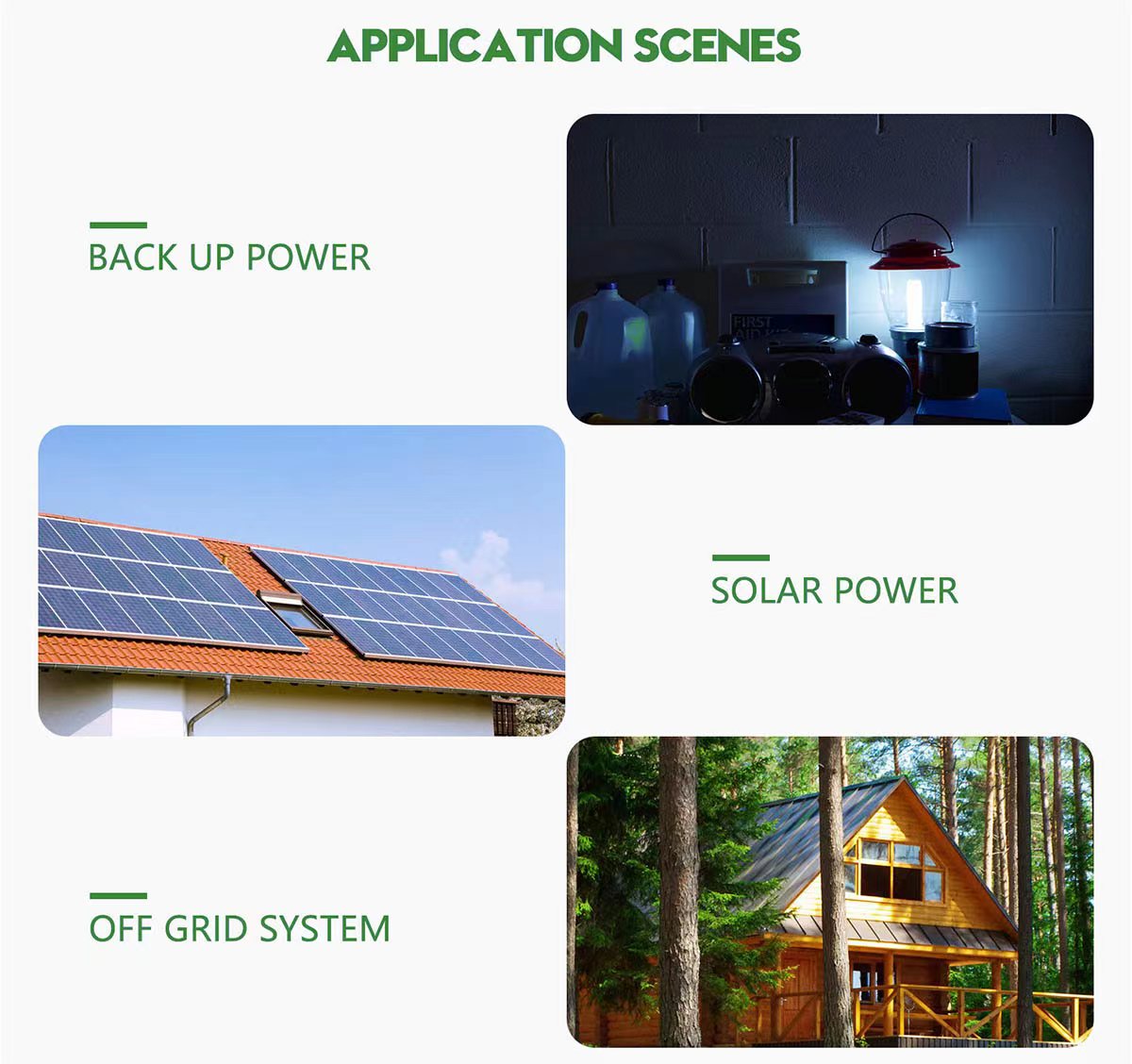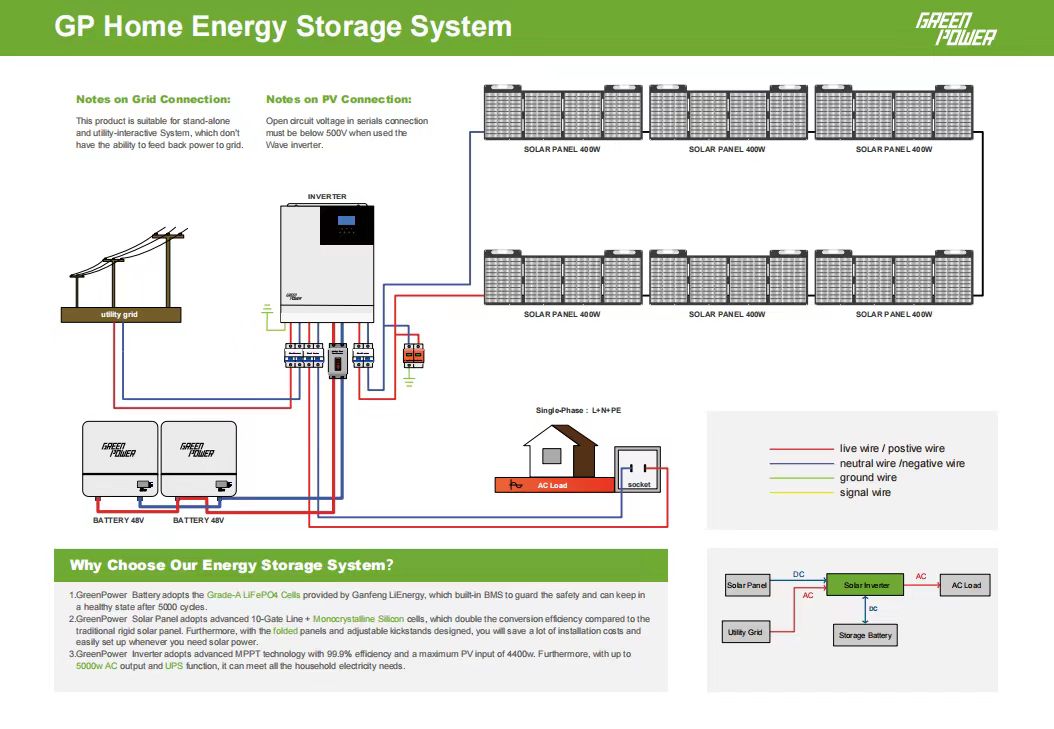Do you need an off-grid solar power system? Off-grid solar power systems rely on energy from the sun, sometimes supplemented by lithium iron phosphate batteries or the grid as backup.
To achieve this, you need to install a solar power system with lithium iron phosphate battery storage.
Off-grid solar systems are great for areas with erratic power supplies and frequent blackouts. They are also critical in areas without access to the grid and need to be powered by off-grid solar power systems.
If you are considering purchasing an off-grid solar system for your home, you are in the right place. Before you buy, this blog will provide you with valuable information to help you determine if you need an off grid solar power system and guide you in purchasing the correct system for your requirements.
What is an off-grid solar power system?
Many people often associate "off-grid solar" with solar panels and batteries. However, there are several other components involved in building a complete off-grid solar power system.
The off-grid solar system mainly relies on battery power, and when the battery energy is exhausted, it will switch to lithium iron phosphate battery or the grid as a backup. Depending on their mode of operation, they are also called stand-alone solar power systems.
Unlike grid-tied solar systems, off-grid solar systems rely on batteries to provide power when solar energy is not available.
Lithium iron phosphate batteries are an important part of off-grid solar systems because they store solar energy in the battery. They have long life and high performance. Compared to other battery types, lithium iron phosphate batteries have longer cycle times, better charging performance, and lower maintenance costs.
Different Applications of Off Grid Solar Power Systems
One of the significant advantages of solar energy is its versatility, allowing solar panels and batteries to be designed for various needs. The application of off-grid solar system is very flexible. They can be used in three-phase systems as well as single-phase systems, and in some places there are even low-voltage systems.
Here are some of the most common applications for off-grid solar power systems:
Powers small camping equipment
Powers RVs
Generates electricity for homes
Acts as the main power source for hotels, hospitals and factories
Equipment needed for off-grid solar power systems
Below is a list of the equipment needed for an off-grid solar power system to function properly:
Solar panel
PV string combiner
Solar charge controller
Solar inverter
Lithium iron phosphate battery
Solar panel bracket
Cable and accessories
How to determine the scale of off-grid solar power generation system?
We will size an off-grid solar power system in three steps:
Step 1: Calculate the inverter power.
Step 2: Calculate the number of solar panels needed.
Step 3: Calculate the number of batteries needed.
Calculating Inverter Power
For example, if you need to install an off-grid solar system for a home with a 9000 BTU air conditioner, we recommend a 5kW inverter.
Electric motors for inductive loads such as pumps and inverter air conditioners consume 4-6 times their rated power at start-up. This is why the light flickers when the air conditioner is on.
For a 9000 BTU air conditioner, that's 750 watts. Since they consume 4-6 times as much power at startup, we need larger inverters to power them. That's why we need a 5kW inverter to power a 9000 BTU air conditioner.
Calculation of total electricity usage requirements
You can list all the appliances you plan to use and how long they will be used to determine your daily electricity usage. This will help in calculating the number of solar panels and lithium iron phosphate batteries required for off-grid solar power systems. Knowing the daily kilowatt-hour usage will help determine the size of the solar panel array and battery.
For example, if you have three 100W fans for 6 hours per day and a 250W TV for 5 hours per day:
Total power consumption is:
3 fans * 100 watts * 6 hours + 1 TV * 250 watts * 5 hours = 3050 watt hours
Assuming 6 hours of full sunlight:
You will need:
3050 watt hours ÷ 6 hours ÷ 0.8 efficiency factor = 635 watts
Therefore, you need at least two 320-watt solar panels.
Determine battery storage capacity
Next, you need to decide how much battery capacity you need. Do you want to meet your power needs for the day or have extra spare capacity?
For example, if you use a 250W TV for 3 hours at night and 10 10W lamps for 6 hours:
You will need:
1 * 250 watts * 3 hours + 10 * 10 watts * 6 hours = 1350 watt hours
The most common capacities of lithium iron phosphate batteries are 100Ah, 150Ah and 200Ah.
The capacity of a 200Ah lithium iron phosphate battery is:
51.2V * 200Ah = 10240 Wh
That's why a 200Ah lithium iron phosphate battery can meet all your requirements.
And always remember to never use the battery at 100% as this may damage the lithium iron phosphate battery.
The Cost of Off-Grid Solar Power Systems
Off-grid systems can range in price from around $100 (for a phone or tablet charger) to tens of thousands of dollars. This is because off-grid solar power systems cover a wide range, from 300 watts to 300 kilowatts.
If we're talking specifically about off-grid solar kits that can power a home or factory, prices vary.
Note that the above costs are specific to off-grid solar power systems. Additional labor costs will be incurred if a professional solar company is used for installation.
However, there are many brands on the market now, and the prices are relatively low. But be sure to check reviews and warranty details before buying.
Customized 24-hour off-grid solar power generation system
Advantages of off-grid solar power systems
It is estimated that more than 300,000 households use off-grid electricity to meet their energy needs. Here are some reasons families choose to live off-grid:
Off-grid: The main reason people are interested in off-grid solar power systems is that urban power grids often experience unplanned power outages. When the grid goes out, so does your power supply, and you won't be able to use any of your appliances because there's no backup power.
With an off-grid solar power system, when the city grid goes out, you can still use all your home appliances.
Good for the environment: Using diesel generators as backup power can create bad smells and loud noises. Switching to off-grid power can reduce carbon emissions. The inverter runs quietly and has no odor.
Off-grid solar power systems require no fuel and require less maintenance than generators.
Sometimes the Only Choice: In remote areas, there is simply no access to the power grid. If you contact the local power company for grid connection, they may tell you that you are beyond their supply area, or they might offer to lay cables to connect you to the grid, but at a high cost . This means you need a self-generating power source. You can use a backup generator, but fuel costs are expensive, and maintenance is required. This makes solar energy the only viable option for off-grid power. Do You Really Need an Off-grid Solar Power System
?
Off-grid solar power systems are the best power source in areas where it is difficult (or impossible) to access the power grid.
Diesel power requires fuel and maintenance.
If you just want to save on electricity bills, do you really need an off-grid solar power system?
That's because home off-grid solar systems are costly and the batteries only last a few years. Also, the inverter powers all household appliances, so if the inverter fails, the entire system will be unusable until the inverter is repaired.
If you just want to save money on your electricity bills, you might consider an on-grid solar system. You can save on daytime electricity bills by generating electricity during the day.
This does not affect the policy of not selling back solar to local utilities. This is because you can add a 0 export option to prevent excess solar from being sent back to the grid.
Post time: Jul-22-2023













